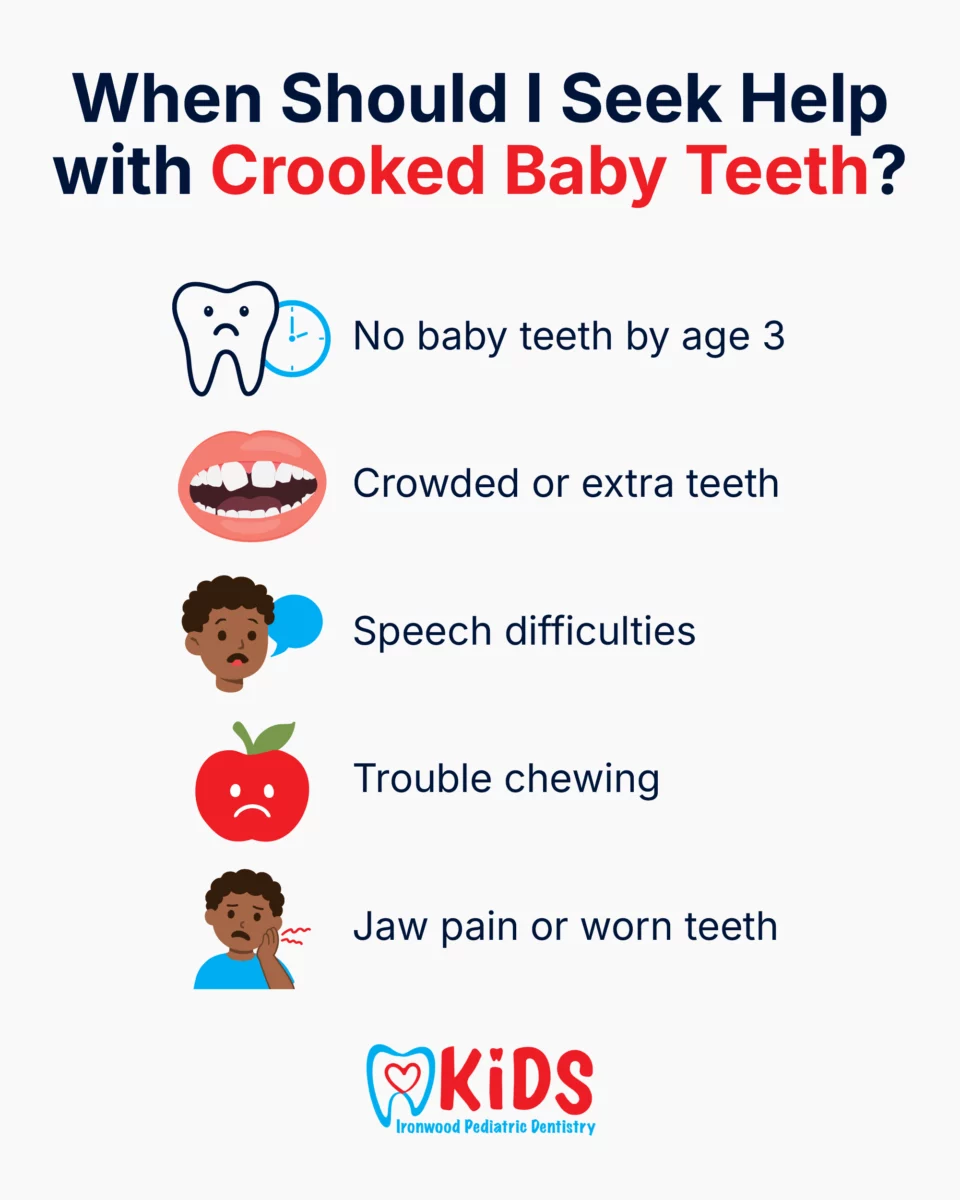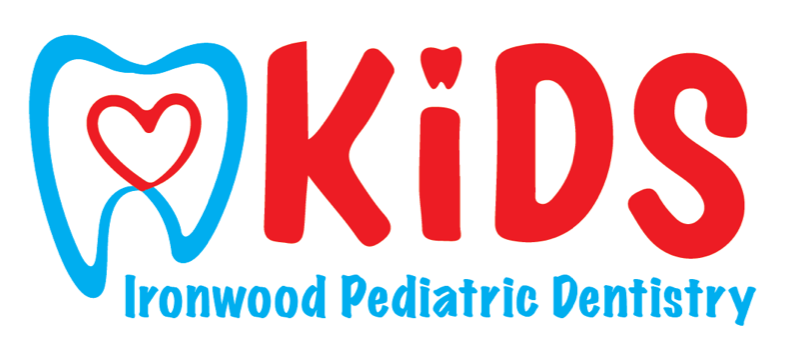Crooked baby teeth or “milk teeth” are common.
Under most circumstances, baby teeth coming in crooked do not pose a serious problem for your child. Often, as your child grows older, crooked baby teeth will correct themselves.
Even when they do not completely do so, formal corrective treatment is not usually needed because baby teeth are placeholders for adult teeth and are going to come out in any event.
In this article, we discuss the kinds of crooked baby teeth your child may experience, what causes crooked baby teeth, and some actions you can take to help your child’s baby teeth stay healthy even if they are not perfectly straight.
When Should I Seek Help with Crooked Baby Teeth?
Here are some specific situations when you may want to consult a pediatric dentist about crooked baby teeth:
- Baby teeth that do not erupt by the time your child reaches the age of three
- Crowded teeth, including extra teeth
- Your child is experiencing speech problems
- Your child is having trouble chewing food
- Your child is experiencing symptoms of irregular tooth wear, like jaw pain and discomfort, headaches, or worn or cracked baby teeth

Types of Crookedness in Baby Teeth
Crooked baby teeth usually take one of three forms:
- V-shaped bottom teeth. This condition is often self-correcting as your child grows older and the jaws grow and develop.
- Overcrowded teeth. Although this can be a problem with adult teeth, overcrowding with baby teeth is not a serious problem in itself and can be self-correcting as your child’s mouth continues to grow.
- Angled or slanted teeth. This is a common misaligned teeth condition with baby teeth and is, like with the two conditions above, not usually a cause for concern.
Causes of Crooked Baby Teeth
Crooked baby teeth can happen for several reasons. Some you can influence, others you have no control over.
Family Genetics
Your child’s family history will often play a role in the development of crooked baby teeth.
Genetics is the most common reason for this condition.
Any combination of genetic factors can contribute to your child’s odds of having crooked baby teeth.
If one or both parents had crooked teeth as children or issues with a large or small jaw size in early childhood, then it is more likely that the child will have crooked baby teeth.
In rare cases, your child might even have at least one “extra” baby tooth that will usually need to be extracted to allow the other teeth to grow properly.
The good news is that genetic causes will often resolve themselves as your child grows.
Behavioral Causes
Another common reason for baby teeth becoming crooked is habitual behaviors, or what dentists and orthodontists call myofunctional habits.
These behaviors can push the front teeth forward and misalign them into an open bite. They can even affect the development of the jaw, leading to misalignment problems when adult teeth begin to come in.
Examples of these myofunctional habits include:
- Digit sucking, (thumb sucking)
- Tongue thrusting while swallowing
- Prolonged use of a pacifier or bottle
- Poor nutrition
- Poor oral hygiene
- Injury to the mouth or face
The good news is, unlike genetic causes, you can help your child overcome myofunctional causes of crooked baby teeth.
Your pediatric dentist can also encourage better habits and find ways to overcome bad ones.
Taking your child in for regular dental checkups can help your dentist spot developing problems early.
What Can I Do About Crooked Baby Teeth?
As we mentioned above, there is little you can do about genetic causes of crooked baby teeth.
For other causes, though, here are some actions you can take to reduce the chance of baby teeth becoming misaligned:
- Encourage your child to overcome digit sucking.
- Do not use a pacifier with your child after reaching 12 months of age.
- Practice good oral hygiene habits like regular toothbrushing and flossing as soon as the first baby teeth emerge.
- Limit the amount of sugar in your child’s diet to reduce the chance of tooth decay and gum disease.
- Take your child to the dentist for regular checkups and dental cleanings. During these visits, the dentist can evaluate potential crooked teeth problems early on.
Can Crooked Baby Teeth Lead to Crooked Adult Teeth?
Most of the time, when your child’s baby teeth begin to fall out, they will do so in a way that allows for your child’s adult teeth to develop properly.
However, baby teeth may occasionally fall out too soon or not come out soon enough; this irregular process may contribute to crooked permanent teeth.
When this happens, your child’s dentist has some options that can foster the proper progression of permanent teeth replacing the baby teeth.
- Space maintainers can keep baby teeth from shifting into gaps left by other baby teeth that have fallen out prematurely.
- Baby teeth that will not come out properly can be extracted.
Interceptive Orthodontics
Many times, crooked teeth issues will either correct themselves or will not be serious enough to require braces or other orthodontic treatment.
However, in some cases, your orthodontist may recommend early childhood orthodontics, like Invisalign clear plastic aligners.
Invisalign aligners can prevent crooked baby teeth from leading to problems with your child’s jaw development, such as interfering with the eruption and growth of adult teeth.
Call Ironwood Pediatric Dentistry if You Child’s Baby Teeth are Crooked
If you have any concerns about your kids’ developing teeth, our pediatric dentists and orthodontists at Ironwood Pediatric Dentistry can help.
We can answer questions about your child’s teeth and identify any potentially serious problems when you bring your child in for a checkup visit with us.
We can spot crooked teeth problems you might not see, which allows us to treat them as quickly and affordably as possible.
Call us at (480) 422-4544 to schedule an appointment!
